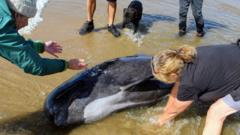What Caused the Whale to Stranded and Die on the Beach?

Published: 2025-09-03 17:45:32 | Category: wales
A long-finned pilot whale, just 12 months old, tragically died after stranding on Llangennith beach in Swansea. Despite the best efforts of beachgoers, including a local named Adi Armoni, the whale could not be saved. The incident highlights the challenges of marine animal rescues and the urgent need for effective responses to strandings.
Last updated: 29 October 2023 (BST)
Key Takeaways
- A 12-month-old long-finned pilot whale was stranded at Llangennith beach.
- Despite attempts to rescue it, the whale died in the hands of a beachgoer.
- Marine Life Rescue arrived too late to assist the animal.
- Stranding incidents highlight the difficulties in marine animal rescue efforts.
- Community involvement can be crucial in such emergencies, but professional support is essential.
Overview of Stranding Incidents
Stranding incidents involving marine mammals, such as whales and dolphins, are not uncommon along the coasts of the UK. These occurrences can be attributed to various factors, including illness, navigational errors, or environmental stresses. When these animals become stranded, time is of the essence, as they require immediate assistance to survive.
What Happened in Llangennith?
On Monday at around 14:30 BST, beachgoers at Llangennith beach discovered the long-finned pilot whale stranded on the shore. Adi Armoni, a local who witnessed the scene, reported that a group of people was already attempting to assist the whale when he arrived. As the tide receded, the conditions became increasingly unfavourable for the animal's survival.
Efforts to Rescue the Whale
Mr Armoni and others attempted various methods to help the stranded whale. Recognising the urgency, he suggested digging a hole underneath the whale’s head to allow it to breathe more easily. However, the whale was too heavy for the group to move effectively, and as the conditions worsened, it became increasingly clear that their efforts might not be enough.
Despite their attempts, the whale succumbed to its injuries and died shortly thereafter, mere minutes after Mr Armoni entered the water to provide support. Tragically, Marine Life Rescue arrived approximately 30 minutes after the whale was first spotted but could only confirm its death. The delay in professional assistance highlights the need for a more efficient response system to marine strandings.
Understanding Long-finned Pilot Whales
Long-finned pilot whales (Globicephala melas) are social, intelligent creatures known for their strong familial bonds. They typically inhabit deep ocean waters and are often found in groups. These whales are distinguished by their long, slender bodies and can grow up to 6–8 metres in length. Their diet mainly consists of squid, fish, and deep-sea crustaceans.
Causes of Stranding
Stranding can occur due to several reasons, including:
- Illness or injury: Sick or injured whales may become disoriented and wash ashore.
- Environmental factors: Changes in sea temperature, food availability, or pollution can drive whales to shore.
- Sound pollution: Increased underwater noise from shipping and industrial activities can disorient marine mammals.
- Social behaviour: Sometimes, group dynamics can lead to mass strandings, particularly if one member of a pod is in trouble.
The Role of Marine Life Rescue
Marine Life Rescue organisations play a critical role in responding to strandings and providing care for marine animals in distress. Their trained volunteers work to assess the situation, provide immediate support, and coordinate with professional rescue teams when necessary. However, as demonstrated by the incident in Llangennith, timely intervention is crucial for the survival of stranded animals.
What Can Be Done in Future Incidents?
To improve outcomes in future stranding incidents, several measures can be taken:
- Awareness and Education: Educating the public on how to respond to stranded marine animals can help save lives. People should know who to contact and how to assist without causing further distress to the animal.
- Rapid Response Teams: Establishing dedicated rapid response teams can ensure that trained professionals arrive promptly to assist stranded animals.
- Monitoring and Research: Continuous research into the causes of stranding and monitoring marine mammal populations can help identify potential threats and mitigate risks.
- Community Involvement: Engaging local communities in marine conservation can foster a sense of responsibility and encourage timely reporting of stranding incidents.
What Happens Next?
Following the death of the long-finned pilot whale, authorities will likely conduct a post-mortem examination to determine the cause of death and gather data that may aid in understanding the health of marine mammal populations in the area. This information can be crucial for conservation efforts and for preventing future strandings.
Conservation Efforts for Marine Life
Conservationists are continuously working to protect marine mammals and their habitats. This includes advocating for marine protected areas, reducing pollution, and addressing the impacts of climate change. The public can contribute by supporting local conservation initiatives and being proactive in reporting stranded animals to the appropriate authorities.
FAQs
What should I do if I see a stranded whale?
If you encounter a stranded whale, it is crucial to contact local marine rescue organisations immediately. Avoid trying to move or push the whale back into the water, as this can cause further injury. Stay with the animal and provide as much information as possible to the rescue team.
Why do whales become stranded?
Whales may become stranded due to various reasons, including illness, environmental factors, navigational errors, or social behaviour within their pods. Each stranding incident can have different underlying causes.
What is the role of Marine Life Rescue?
Marine Life Rescue organisations are responsible for responding to stranded marine animals, assessing their health, and providing necessary support. They often work with trained volunteers and professionals to ensure the best possible outcome for the animals.
How can the public help during a stranding event?
During a stranding event, the public can help by reporting the incident to authorities and staying with the animal to monitor its condition. Educating themselves about proper protocols can also ensure that they provide effective assistance without causing harm to the whale.
What happens to whales that die after stranding?
When a whale dies after stranding, a post-mortem examination may be conducted to determine the cause of death. The data collected can help inform conservation efforts and contribute to understanding marine mammal health.
In light of this recent tragedy, it is essential to reflect on the importance of marine conservation and to advocate for better response systems for stranded marine life. How can we improve our efforts to protect these magnificent creatures in the future? #MarineConservation #WhaleStranding #Swansea



